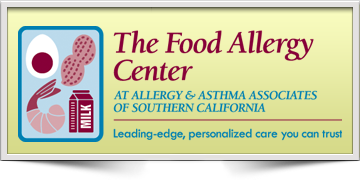How is food allergy testing performed?
When there is a concern for food allergy your doctor may order one of the following tests to check you bodies immune reaction to food proteins:
- Skin testing:
- Skin testing involves placing a small drop of a sterile food extract on the skin and pricking the skin with a small plastic testing device. These devices are typically preloaded with the food extract and are single use, disposable devices. These tests are usually done on the back or arm and results are available in about 15 minutes. If you are allergic then a small red itchy bump will appear at the testing site.
- Skin testing for allergies to things that you may inhale (pollen, animal dander) may involve an intradermal skin test. In these tests a small amount of the substance is injected into the skin. This type of testing is not used in food allergy testing as there is risk for a severe allergic reaction.
- There is a general misunderstanding that these tests are painful and can not be performed on infants.Studies have shown that these tests are actually very well tolerated with minimal pain.Furthermore, skin testing can be performed at any age.
- Blood testing:
- Blood testing, commonly referred to as RAST testing is not performed as often as the skin tests but have value in certain settings. These tests measure the amount of the allergic antibody or IgE in the blood stream. Keep in mind that it is not the IgE in the blood that results in allergy but the IgE that has left the blood stream and has become attached to allergy cells called MAST cells. Your body will make this type of antibody when you are allergic. A skin test, as discussed above, is the test of choice to detect the presence of IgE attached to MAST cells. When skin testing can not be performed then the blood test will be performed.
- Commonly random screening tests to multiple foods will be performed on blood sample in search of a possible allergy. This practice is not advised as it frequently results in false positive reactions and unnecessary food avoidance.
- Food challenge testing:
- This type of testing should only be done in the office of an allergy specialist that is trained in managing severe allergic reactions. With this test increasing amounts of a food are given over time and you are observed for signs of a food allergy.
- Elimination diet:
- Your doctor may want you to stop eating suspect foods for a week or two and then add the foods back into the diet one at a time. This process may help to identify specific foods causing certain symptoms. During this time it is important to keep a good food diary. If you have had a severe reaction to foods, this method cannot be used.
What are some common symptoms of food allergy?
You may need food allergy testing if you have had any of the following symptoms after eating:
- Wheezing or trouble breathing
- Skin rash or hives
- Itching all over
- Swelling in the lips, face, throat, or other part of the body
- Vomiting
- Diarrhea
- Stomach cramps
- Coughing
- Change of voice
- Trouble swallowing
- Throat tightness or closing
- Red, watery eyes
- Dizziness
- Fainting
- Sense of doom
What do I do to prepare for food allergy testing?
You should ask your doctor if there are any medications that you need to avoid prior to the testing. Typically, with skin testing you will need to avoid certain medications such as antihistamines for several days prior to the tests. You typically do not need to stop any of your other regular medications.
What do I do if the tests are positive?
Your doctor will review your tests with you. If you are positive that means you are allergic to those foods and should strictly avoid them. If you have had severe reactions in the past your doctor may recommend you carry epinephrine injections and wear a medic alert bracelet or necklace.








